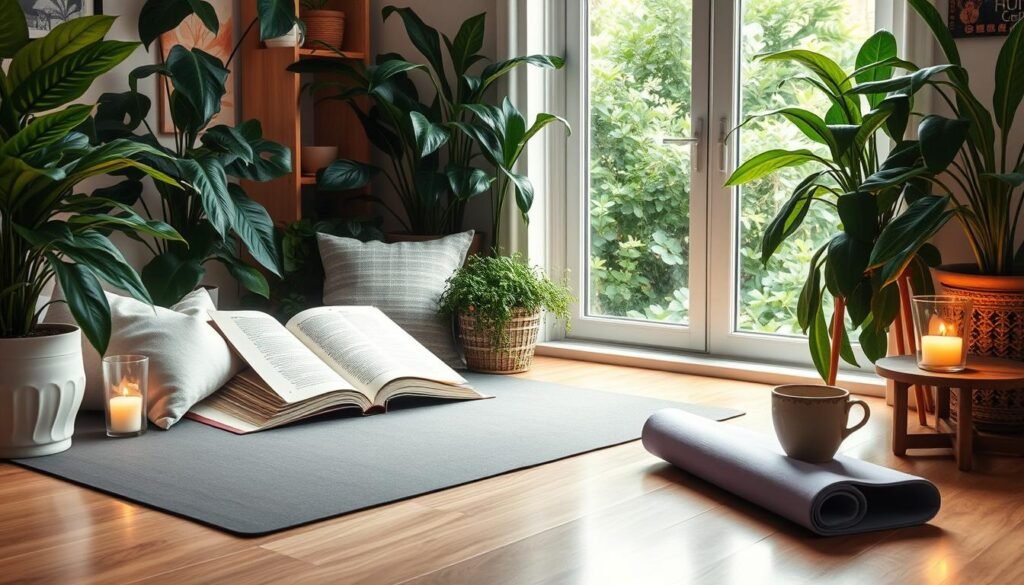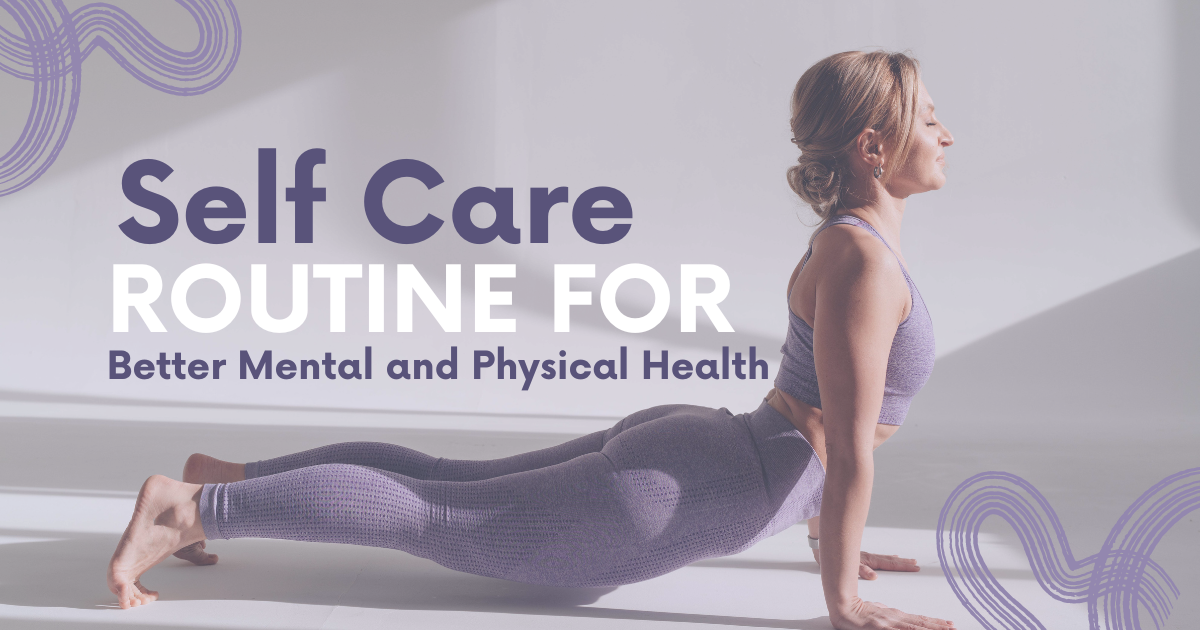In today’s fast world, taking care of ourselves can be hard. But, it’s key to have a self-care routine for better health. Matthew Sacco, a psychological expert, says anyone can plan a self-care routine. Self-care is more than a trend; it’s a way to improve your health through actions.
By setting specific goals and using the S-M-A-R-T framework, you can make a routine that fits you. This approach helps you grow in the long run.
Table of Contents

Starting self-care can seem tough, especially for beginners. But, research shows it takes about 66 days to form a habit. This time can vary, making it seem hard.
Remember, it’s okay to have ups and downs in self-care. Instead of giving up, adjust to life’s changes while keeping your self-care goals in mind.
Key Takeaways
- The average time to establish a new habit varies but is around 66 days.
- A self-care routine should include activities of varying frequencies—daily, weekly, monthly, and yearly.
- Adapting to changes is key when lapses in self-care occur; don’t be discouraged.
- Utilizing the SMART framework helps ensure your self-care goals are precise and achievable.
- Self-care activities should be deliberately chosen to meet individual needs for effectiveness.
- Enjoyment is a critical component of effective self-care practices.
Understanding Self-Care and Its Importance
Self-care is key to staying well. It’s about taking care of your mind, body, and spirit. Knowing what self-care is helps improve your mental and physical health.
Definition of Self-Care
Self-care means doing things that make you healthier in many ways. It’s not just about your body. It also helps your emotions and mind, so you can handle life better. In today’s busy world, self-care is more important than ever.
Benefits of Self-Care for Mental and Physical Health
Self-care is very important. Many studies show it helps your mind and body. Here are some ways it can help:
- Reduce or eliminate symptoms of anxiety and depression.
- Lower stress levels and improve concentration.
- Boost energy and minimize feelings of frustration and anger.
- Enhance overall happiness and build self-esteem.
- Prevent burnout, which results from prolonged stress.
Self-care also makes your immune system stronger. It can lower the risk of heart disease, stroke, and some cancers. It makes you more productive, focused, and clear-minded. Surveys show it boosts confidence, happiness, and work performance. So, adding self-care tips to your life can bring lasting benefits.
Types of Self-Care Practices
Exploring different self-care activities boosts both mental and physical health. It’s important to know the various types to create a routine that fits your needs. This section will cover physical, mental, and emotional and spiritual self-care.
Physical Self-Care
Physical self-care is about taking care of your body. Getting enough sleep, eating well, and exercising regularly are key. Activities like yoga, moisturizing, and getting sunlight also help.
Drinking water that matches your body weight in ounces is a good rule for staying hydrated. These habits help your body and mind stay healthy.
Mental Self-Care
Mental self-care is about taking care of your mind. It includes positive thinking and being kind to yourself. Doing creative things, learning new skills, and journaling can help.
These activities help you understand your feelings and lower stress. Talking to a therapist or psychologist can also support your mental health.
Emotional and Spiritual Self-Care
Emotional self-care is about building healthy ways to deal with feelings and nurturing relationships. Setting boundaries and spending time with loved ones is important. It helps with emotional health.
Spiritual self-care is about finding meaning in life. This can include spending time in nature, praying, or helping others. These practices help you connect with yourself and the world around you.

How to Create a Self-Care Routine for Better Mental and Physical Health
Creating a self-care routine needs careful planning and dedication. The first step is to set your self-care goals. Knowing what areas of your life need attention can greatly improve your health. By setting clear goals, you start building a routine that includes various self-care strategies.
Identifying Your Self-Care Goals
Good self-care begins with setting specific, achievable goals. Use the S-M-A-R-T framework to help. This means your goals should be Specific, Measurable, Achievable, Relevant, and Time-bound. Focus on goals that help your mental and physical health, like better sleep, regular exercise, or stress management.
These goals will guide you in making a self-care routine you can stick to and enjoy.
Layering Your Self-Care Activities
Adding different self-care activities makes your routine more interesting. Daily routines might include quick meditation or a short walk. Weekly activities could be socializing or a hobby. Monthly, plan a spa day or an outdoor trip.
This layered approach brings variety and a sense of accomplishment. It keeps you motivated and helps with long-term wellness.

| Frequency | Activity Examples | Benefits |
|---|---|---|
| Daily | Meditation, Journaling, Walking | Reduces stress, improves mood, enhances focus |
| Weekly | Yoga, Cooking a healthy meal, Socializing | Boosts social connections, fosters creativity, reinforces healthy eating habits |
| Monthly | Spa day, Hiking, Crafting | Promotes relaxation, encourages exploration, nurtures personal interests |
This approach ensures all aspects of wellness are cared for. It leads to a balanced and fulfilling life.
Daily Self-Care Routine: Simple Practices to Start With
Adding simple practices to your daily routine can boost your well-being. Starting your day with self-care sets a positive note. Mindfulness exercises help you stay focused, making everyday tasks easier. A good evening routine can also help you relax and sleep better.
Activities to Incorporate into Your Morning Routine
Starting your day right means making smart choices. Here are some activities to think about:
- Reading something inspiring can lift your mood and fill you with positive thoughts.
- Journaling lets you reflect on your goals and feelings, helping you stay grounded.
- Stretching or light exercise wakes up your body and gets your blood flowing.
- Enjoying your morning beverage mindfully helps you stay present and aware.
Creating a Relaxing Bedtime Routine
As the day ends, adding self-care to your bedtime routine can create a calming atmosphere. Try these ideas:
- Taking a warm bath relaxes your muscles and tells your body it’s time to unwind.
- Practicing gratitude improves your mood and helps you reflect on the good things from your day.
- Creating a ‘worry list’ lets you get your concerns out, reducing stress before bed.
Overcoming Challenges in Maintaining Your Self-Care Routine
Keeping up with self-care routines can be tough, especially when life changes suddenly or gets very busy. It’s important to remember that it’s okay to have ups and downs. Seeing these moments as part of the journey helps us stay positive about self-care.
Psychologist Matthew Sacco says it’s key to forgive ourselves when things get tough. Remember, these challenges are just part of the path, not failures. They show we’re on a journey, not stuck in one place.
Understanding Lapses and Variability
Dealing with setbacks can be hard, especially when life throws us curveballs. Things like new jobs, family needs, or health issues can make it hard to keep up with self-care. But, by accepting these changes, we can focus on the bigger picture.
This way of thinking helps us succeed in the long run. It makes self-care more balanced and sustainable.
Finding Flexibility and Adaptability in Your Routine
Being flexible with self-care can make it easier to keep up, even when things change. We can adjust by changing our priorities and trying new things. For example, if morning meditation is hard, try it at night instead.
This flexibility keeps self-care exciting and relevant to our current needs. It makes sure we’re always taking care of ourselves in the best way possible.
Conclusion
Creating a self-care routine is key for your mental and physical health. Stress and anxiety are big issues today. Knowing how important self-care is can help you deal with these problems.
With 60-80% of doctor visits due to stress, self-care is more important than ever. Activities like exercise, healthy eating, and sleep are crucial. Even a short mindfulness practice each day can boost your mental health and prevent burnout.
Self-care is a personal journey that starts with knowing yourself. It’s about making choices that match your values and goals. By being grateful and setting boundaries, you can live a happier, healthier life. Start your self-care journey today and watch how it improves your life and the lives of those around you.
FAQ – Self-Care Routine for Better Mental and Physical Health
What is self-care?
Self-care means taking actions to keep and improve your health. It covers physical, emotional, mental, and spiritual well-being.
How can I improve my mental health through self-care?
Self-care can help reduce stress and anxiety. It can also lead to better mental health. This includes less depression and more happiness.
What are some examples of self-care activities?
Self-care can include getting enough sleep and eating well. It also means exercising, practicing mindfulness, and staying connected with others.
How do I create a self-care routine?
Begin by setting self-care goals using the S-M-A-R-T framework. Add daily, weekly, and monthly activities to keep your routine balanced.
What should I include in my daily self-care routine?
Start with simple acts like reading something uplifting or journaling. Stretching and practicing gratitude are also good. Doing these in the morning and before bed helps set a positive tone and relaxes you.
How can I overcome challenges in maintaining my self-care routine?
Remember, it’s okay to have setbacks. Forgive yourself and adjust your routine as needed. This helps keep your self-care habits strong.
Why is self-care important for overall wellness?
Self-care boosts both mental and physical health. It helps you handle stress better and live a fulfilling life. This improves your overall well-being.

